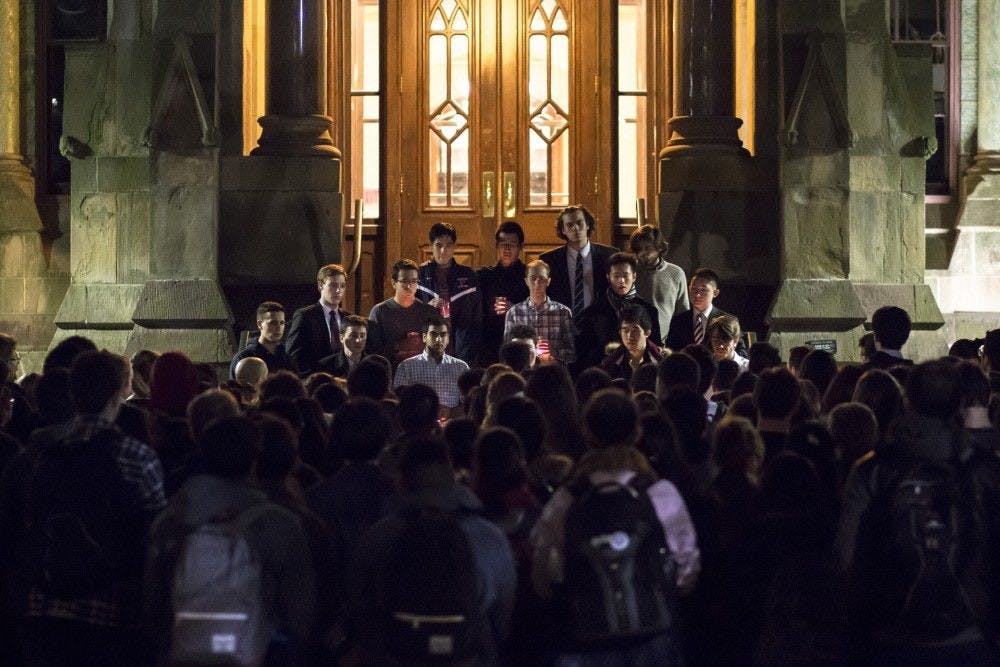
In light of the recent suicides at Penn, a new Pennsylvania bill aiming to improve suicide prevention services and mental health resources at Pennsylvania universities is close to being signed into law by Gov. Tom Wolf (D-Pa.).
The legislation defines a new set of standards that four-year institutions must meet to become a Certified Suicide Prevention Institution of Higher Education, as recognized by the Pennsylvania Department of Education.
In order to receive the certification, schools must provide contact information for suicide prevention hotlines, crisis intervention services, mental health services, post-intervention plans in the event of a suicide, and describe how these plans will be communicated with student body, said author of the bill state Rep. Mike Schlossberg (D-Pa.). The representative confirmed that the certification would apply to all universities in Pennsylvania, including private schools like Penn.
In a press release, Schlossberg also said the new bill was inspired by a study conducted in response to "multiple suicides at the University of Pennsylvania."
When asked to comment on the legislation, University spokesperson Stephen MacCarthy said Penn takes the mental health of its students "very seriously," citing numerous actions the school has taken in the past years.
"We have appointed the Ivy League’s first chief wellness officer, expanded services at CAPS, and launched the Wellness at Penn initiative, which offers opportunities to reflect and engage on issues of wellness, stress, mental health, resilience, happiness, and personal and academic goals," MacCarthy wrote in an email.

"I think colleges are really starting to realize the strain that mental illness is causing and the negative impact it can have, not only on students but on the institutions themselves," Schlossberg said in an interview with the DP. "Colleges have to, on the whole, do a better job of providing resources and communicating the resources they have available — that's what my bill is trying to get at."
Schlossberg added that the issue of mental health on college campuses particularly hits close to home. Schlossberg has had depression and anxiety issues all his life, and he said they particularly exploded in college.
"When I was a freshman at Muhlenberg, I got lucky," Schlossberg said. "The school was very aggressive in terms of pointing people toward the counseling center who needed assistance. I found the counseling center and they helped get me the help that I need."
Multiple student suicides at Penn prompted State Sen. Vincent Hughes (D) to ask the official legislative research commission to conduct a study into how to reduce suicides in colleges, starting the legislative process.
Schlossberg said he saw the notice of the study and called up Hughes' office, offering to write the House version of the bill.
Initially, Schlossberg's bill required every four-year institution to communicate the mental health and suicide prevention resources that they had. But after pushback from conservatives in the House over this mandate, he modified the legislation to allow for the creation of a suicide prevention certification.
If a college meets the guidelines set out in the law, the school can use its certification in marketing and will also become part of the Department of Education's masterlist of certified schools.
Schlossberg originally introduced the bill in Sept. 2017, and it was approved by the State Senate on Oct. 17 and was sent to Wolf for final approval on Oct. 18, according to 69News. The governor's office has told Schlossberg that Wolf will sign the bill into law soon, Schlossberg said.
Penn’s struggle with mental health crises has been prevalent for years, long before the bill’s initiation. Penn's Mental Health Clinic was founded in 1955 to assist students with mental health needs. In the 1980-90 academic years, seven Penn students passed away, three of whom died by suicide.
More recently, 14 Penn students have died by suicide since February 2013, including nine undergraduate students and five graduate students. In December 2017, Penn Dental Department Chair Ricardo Teles died by suicide.

Penn has also made efforts to address students’ concerns. Following Wharton junior Olivia Kong’s death in April 2016, Penn changed its notification system so all undergraduate students are notified following an undergraduate student’s death. In the 2017-18 school year, Penn held its first “Campus Conversation” to acknowledge students’ struggles, announced the hiring of five new Counseling and Psychological Services staff members, and expanded operating hours at CAPS.
Schlossberg said he believes his legislation can help reduce student suicides on Penn's campus and change the negative cycle statewide.
"The more we can bring awareness to this issue the better," Schlossberg said. "The biggest struggle that I've had with mental illness is that people don't want to talk about it — but every time you talk about it you inspire someone to seek help or you inspire big institutions to do more."
CAMPUS RESOURCES
The HELP Line: 215-898-HELP
Counseling and Psychological Services: 215-898-7021 (active 24/7)
Student Health Service: 215-746-3535
Office of the Vice Provost for University Life: 215-898-6081
University Chaplain’s Office: 215-898-8456
Reach-A-Peer Helpline
- 215-573-2727 (every day from 9 p.m. to 1 a.m.)
- 215-515-7332 (texting service available 24/7)
Penn Benjamins (in-person peer counseling)
- Su, M, T 8-11 p.m. Harnwell Library First Floor
- W, Tr 8-11 p.m. Houston Hall Chaplains Office
The Daily Pennsylvanian is an independent, student-run newspaper. Please consider making a donation to support the coverage that shapes the University. Your generosity ensures a future of strong journalism at Penn.
Donate




